Camping is when you spend some time in the nature and experience both its harsh and its soft and beautiful side. You may be lucky to go camping in a warm and sunny weekend, but you still have to be equipped with some essential items. You must be aware that you can easily pack too much gear in your backpack. What’s crucial is that you keep it simple. You can pack too much or too little, but there’s always a golden means.
[the_ad_placement id=”in-text-1-type-r”]In this article we’ll give general advice, ideas, valuable items, descriptions and uses for each.
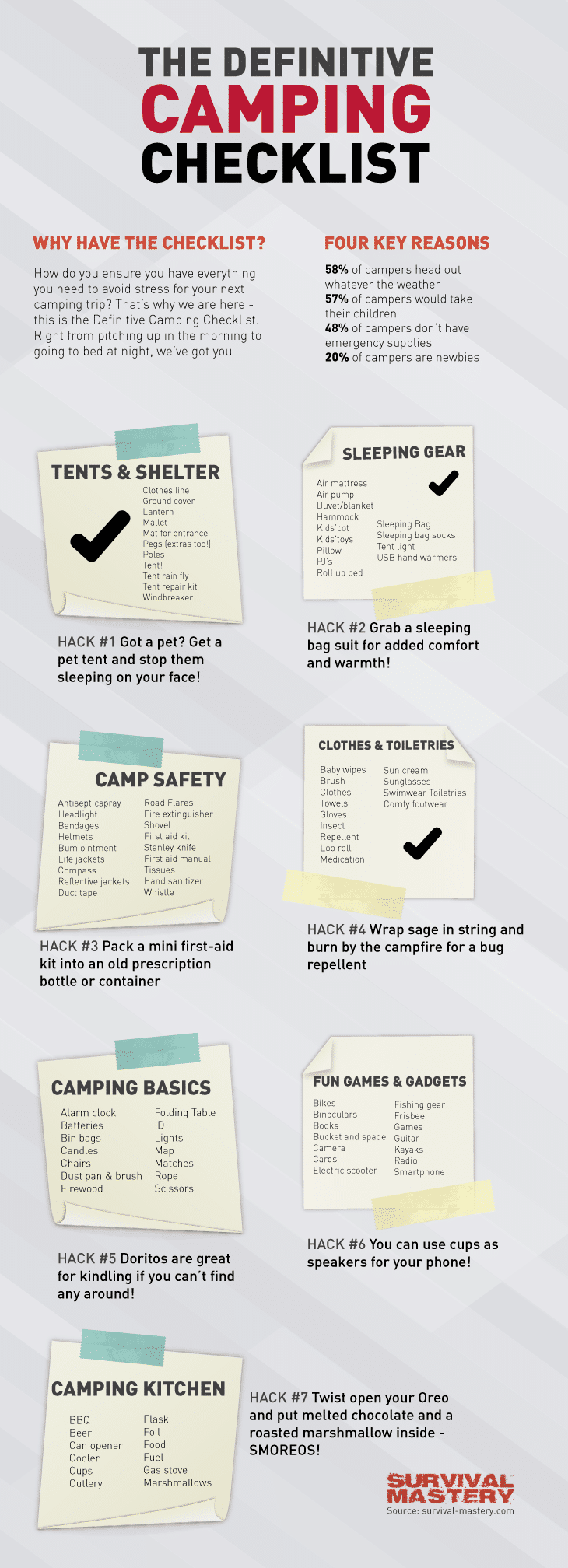
Thus, you will be able to make up your own mind which items are necessary in your specific situation and plans.
Ideas on packing your most essential camping gear
Some of the most important items are included in these categories:
- Food/water
- Clothes
- Cooking
- Sleeping
- Shelter
- First-aid kit
- Knife
We’ll dive in deeper in the individual items we have in mind.
Food and water are and always will be your top priority. Whether you prepare your own survival kit or you’re just packing for a few days of camping, food and water will keep you hydrated and well-fed. If these two are not part of your camping gear, your entire experience will be pretty negative.
Plan very well the amount of water you take along. Humans need at least 1 liter of water per day. If you want to be comfortably hydrated, take more than that. Don’t expect that you will find water sources where you go. If you do though, definitely buy a water purifying system that works on the go. If you’re interested in buying one, we have a complete and in-depth review of one of the best water filters on the go – the sawyer water filter.
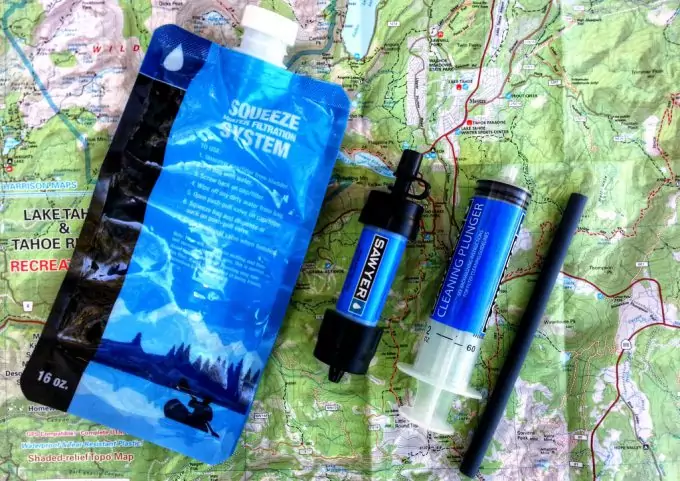
Best pack up canned food. If you want to carry your own home-made meals, prepare a cooler. It will keep the food fresh, and when you make a campfire you can heat it up. Other good options for light-weight food are dried fruits, like resins and dates, nuts, powdered soups. These can be additions to your main meals and probably you won’t rely entirely on them. Nonetheless, they are nutritional bombs and can easily fire up your energy levels. Consider also taking energy bars.
We have a detailed article with reviews and users’ opinions on the best energy bars to have while hiking so don’t forget to take a look!
[the_ad_placement id=”in-text-2-type-r”]The clothes are your main method of keeping warm, safe, dry and comfortable. Don’t underestimate the climate. Even if the weather forecast promises good and sunny weather this weekend, be prepared. Get some extra pairs of everything – pants, jacket, top and bottom underwear (made of Lycra or Polyester), hats, gloves, socks (wool), scarves. Depending on the season, you must get used to packing for worst conditions than the weather report claims they will be. You should also wear layers of clothes to easily adjust to the outside conditions and for this, we invite you to read our layers clothing article.
Get yourself a wind- and waterproof jacket and pants. Add also a poncho. It’s compact and light and maybe even a better protection from rain and moist conditions than the jacket. Your boots should also be waterproof. For best results opt for four-season boots. These you can find in special shops for mountaineering and climbing equipment.
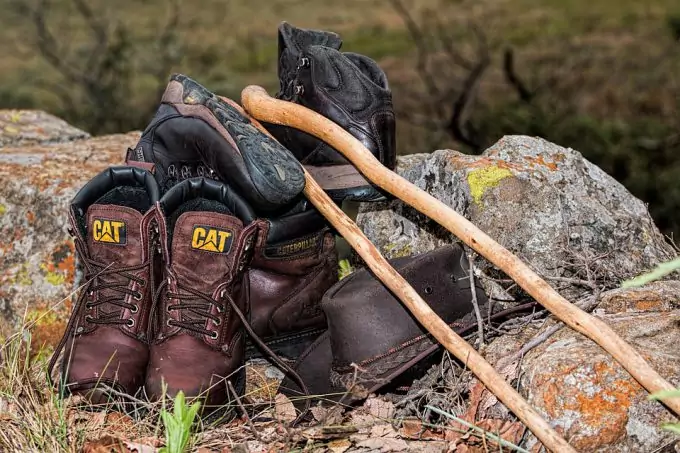
Where can you go without being prepared to cook food? Even if you have run out of your food supply you can still catch your own food (learn how to make snares if you consider a more adventurous camping trip). And for cooking you would want to have pans, cooking gas stove (find those compact and small versions that save you space), plastic spoons, knives and forks, etc. We also have a great article with reviews and ideas on the best camping cookware to own.
You can also find on the internet some very practical cook sets which are basically equipped with everything you may ever need. Yet again, you must to decide how much weight you’re going to carry. Are you going to backpack and camp somewhere for days, or you’re traveling with a van or car and are always close to your vehicle? In the latter case you may use your vehicle’s space to its fullest capacity, and put any type of cooking stove with the cook set along with it. Don’t forget the can opener.
To add to your comfort, prepare a good reliable sleeping pad and a sleeping bag. This is regardless of the season or weather conditions. The pad will save you the discomfort of feeling all the rocks and bumps on the ground. If you decide to sleep directly on the ground, it may be too moist due to rain, or condensation may occur during the night.
The sleeping bag should be carefully chosen. There are many types of sleeping bags, winter, summer, 3-season, etc. Consider the seasonal conditions and choose the bag based on that. If you want a warm and light bag, go for feather-based insulation. If the ethical side of that concerns you, opt for synthetic-based one. It is just as good and has its own pros and cons. It’s slightly heavier, but keeps the warmth even if the synthetic material has been soaked wet. Also, it dries much quicker than the feather-based insulation. If you want to learn more about sleeping bags, take a look at our reviews on the best sleeping bag.
Talking about sleep, along with the sleeping bag prepare a tent or a tarp. If you’re camping alone, all you need is one-man tent. It should be fairly light and compact. The tarp is also compact and has even more applications in wilder conditions.
You can make different types of shelter with a tarp. If it’s too rainy you can attach a hanging tarp shelter, something you can’t do with a tent. If you’re an adventurer learn how to use a tarp and practice building shelters in advance. A three or four-man (and more) tents are a great option for a family of more than two members. A tarp won’t be the best idea if you’re a family with young children. Best provide comfort for them.
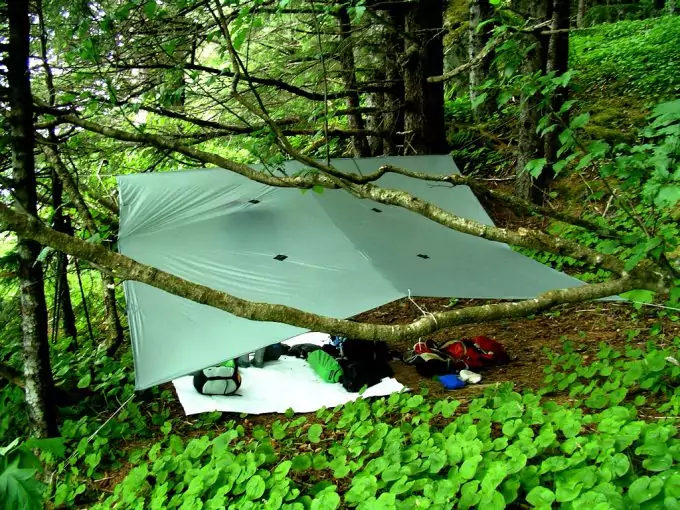
The first-aid kit is an absolute must wherever you go camping. Either build your own first-aid kit or buy ready-made kits on the internet. In either case, prepare the kit well, keep a manual and even test it in real conditions. Go camping for a day or two alone to see if you encounter an unexpected event for which you’re unprepared. Write down notes for each such situation and supply the missing items when you come back home.
The knife is not just for preparing your food or cutting things. It may be a survival tool of great value. It may save your life. Basically, the knife is mostly for protection. Also, if you catch an animal with your snare or had gone fishing, you can prepare your dinner thanks to the pocket knife.
Some other gear of secondary importance
The above list is of course incomplete if we don’t mention survival tools, GPS systems, maps, light, etc. These items are of secondary concern, but yet may turn out as important as the above. It all depends on the time you plan on spending camping and how much (dis)comfort you want to experience. There are some adventurous types who may not necessarily need to take along a camp chair, but others may not go as far as leaving their foldable cooler behind.
Here is our list of items:
- Paper towels, sanitary tissues and napkins
- Pillows
- Maps and compass
- Toothbrush and toothpaste to maintain hygiene
- Soap
- Toilet paper
- Razor blade (if you can’t go without shaving every day)
- Rope
- Lantern, flashlight, headlight, or other electric light source
- Aluminum foil (for cooking)
- Cell or smart phone (turn on the GPS) and batteries
- Whistle
- Camping chairs and table
- Matches and lighter
- Weather specific – insect repellent, sunscreen, sunglasses
Some of these items are definitely providing a bit more comfort, others are clearly helping you orient yourself or even be rescued if something goes wrong.
The towels, tissues and napkins are for higher level of hygiene. If you consider it a luxury, try going on a two-day camping trip without these and see how much you’ll miss them. So, don’t underestimate them and pack them next time you go camping. If not for you, at least do it for your family members. They will thank you later on. The towels and tissues can be used for drying hands, face and feet after washing them. If you don’t just want to sprinkle water on your hands and call that washing, bring some soap, or at least wet sanitized tissues.
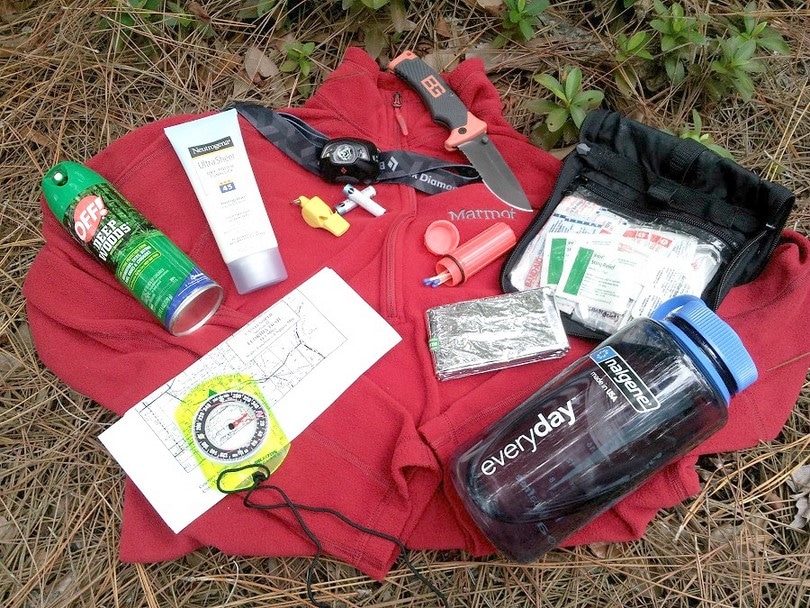
On the topic of hygiene, you don’t want to leave behind your toothbrush and toothpaste. It sure isn’t a vital set of tools, but will keep you clean and comfortable. The morning breath and sense of low hygiene even for a day or two is definitely capable of destroying a good holiday camping.
Don’t forget the toilet paper. Even adventurous types bring toilet paper along. Using plant leaves isn’t a good hygienic habit, and it can be even risky. Some infection may spread through your private parts. Also, there are plants that may be poisonous or at the least, cause rashes, allergic reactions and pain.
If you can’t stand your growing beard, get a razor blade, use the soap, and shave your beard regularly. Other people may have no problem with their beard, but people have different habits when at home.
An extra to your camping experience is the pillow. You may have gone camping before and have slept without this luxury, but maybe some of the younger family members may not be used to this. If not for you, bring pillows for the children. There are plastic pillows that can be inflated before use. Take along some pillow casing to keep it soft to the touch.
Children’s skin can be easily irritated. If you have little or no experience camping, sleeping without a pillow may cause pain in your spinal cord, neck or your whole body. If you’re not accustomed to such discomfort, check the pillow in your list as an important item.
The maps and compass are both extremely important items and can be part of a fun game with your children. If you lose the GPS connection on your smart phone, the map and compass can provide you (if you can read them) with vital information about your location. It may not be as exact as the GPS, but it’s far better than nothing. Technology can’t be relied on blindly. You may have prepared extra batteries, but incidences occur and you may not be able to use your smart phone or GPS gadget.
If you don’t know how to use a map and compass, learn that skill. You can test your knowledge on a trial camping trip and see if you can pin-point your location correctly. Use a GPS along with it, to double-check how good you read the map and compass and whether your skills improve. We also have a great article on map reading that you shouldn’t miss!
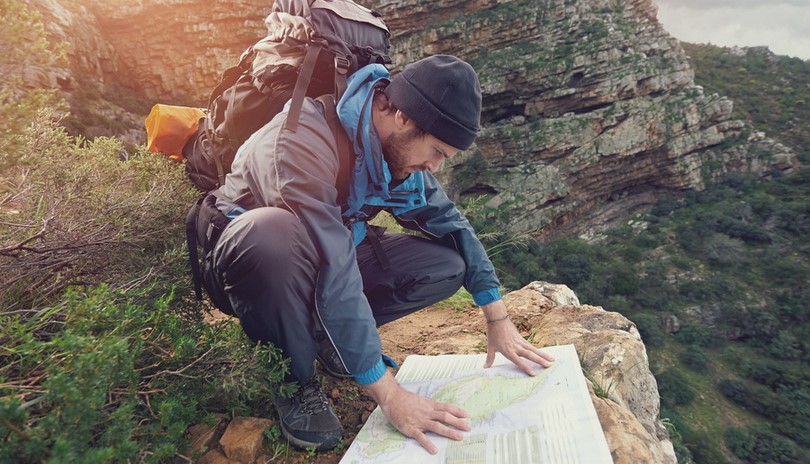
For your camping trip, you may also play games with your children and teach them how to use map and compass. This can be a bonding family experience and can teach the children a basic way to survive if lost in nature.
A quite important item to pack up is the rope. It has several very handy uses. It can be used to build a snare; to tie up your tarp; to hang things from it (bags, food, to keep it unreachable for wild animals); to make a hammock either for sleeping during the night, away from moist ground and animals, or just for relaxing in the mixed shade while reading a book. The rope, as simple a tool as it looks, can be an invaluable item.
Be well prepared with different light sources – lanterns, headlights, flashlights, and anything else that comes to your mind. If you make a campfire, that’s a big enough source of light, but it can’t be kept alight for the whole night. If during the night you may want to relieve yourself you’ll definitely need a headlight or a flashlight. The lantern is good for it’s strong light, spread in a much larger area. Flashlights are more a spotlight type and can be used only occasionally.
A lantern can easily substitute the campfire. Be prepared though that insects are drawn towards light and will gather around your camp. If you have a campfire, on the other hand, insects will be repelled by the smoke. If you stick to the artificial light, citronella and smoke candles are a must. The trick with the candles is that it also produces smoke, like the fire, and bugs will stay away for as long as the candles burn.
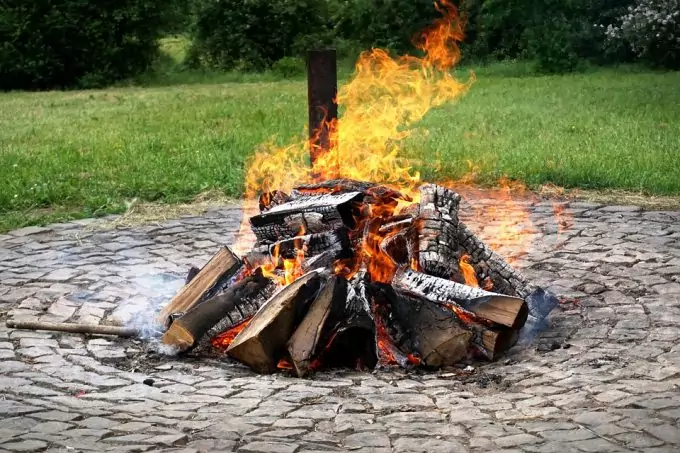
Bring along your cell or smart phone. Turn it off when you don’t plan to use it, to conserve energy. Always bring an extra set of batteries, including a charger. If you’re lost you can use the GPS system built in the smart phone to navigate your way. Be careful though, GPS can consume the phone’s battery extremely quickly. Keep it off when you don’t use it.
For a more comfortable camping holiday with your family, bring camping chairs and table. You may also want to take the grill, instead of making fire yourself. In this respect, aluminum foil is a great way to cook or warm your food.
Wrap the meal in the aluminum foil, make ‘handles’ at the two ends (so you can grab the meal without the risk to burn your hands), twist them several times (like a large candy) and place it next to the fire, near the hottest ambers.
Alternatively, place a large grill rack, but never place it at direct contact with the flames. You’ll burn your food quickly and it may be inedible. If you do so accidentally, remove it as fast as you can and be careful not to burn yourself. Whatever you cook in the aluminum foil, always place a moisture source, like a fresh tomato, vegetable, etc., so that your food won’t end up hard-to-chew dried meal.
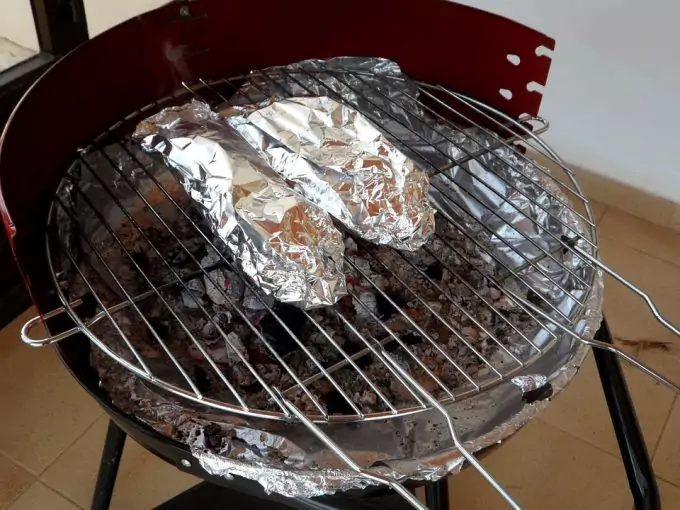
Matches and lighter is also a pretty useful set of tools. They can be used to start the gas stove and cook food, to start a campfire, etc. They may be primitive like the map and compass but are your way to starting a fire, even if just to warm up or cozy around it before sleep.
If you go camping during the summer, never forget the insect repellent, DEET-based cream, medications in case of an allergic reaction (after an insect bite), etc. Any other personal medications are an absolute must-have when packing for the holidays. In addition, get some sunscreen and sunglasses if you have sensitive skin, and especially for those hot noon hours. The morning and afternoon sun helps your body stay healthy and release vitamin D, but during the peak hours, the sunscreen is your best protection against UV light.
[the_ad_placement id=”in-text-3-type-r”]Whether you plan on camping alone or with family, plan some pleasant activities. From just inspecting your camping area to the stationary activities likes cards games, books, magazines, Frisbee, toys, etc. there can be some fun for the younger members. You can determine for yourself what is personally your best way to relax.
An extra bonus is the solar panels. They should have a mains charging plug for cell/smart phones, laptops, etc. You can recharge any of your electronic or tech gadget. You can even pack your laptop and as long as there are sunny hours during the day, you can recharge your machine regularly.
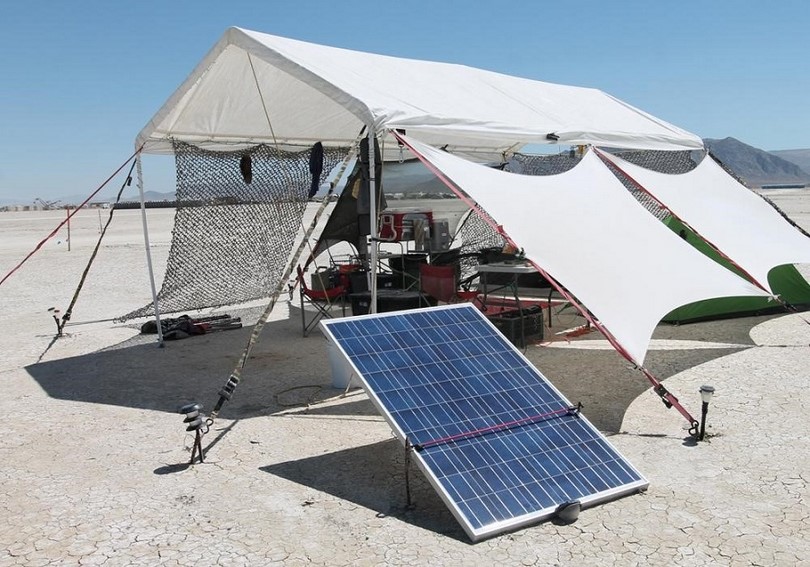
In conclusion, we’ll say that camping can be a very good way to lower the stress hormones after months of work at the office. Whether you go backpacking and settle the camp alone in the nature, or drive to your favorite camping location with your family, you can spend some comfortable and enjoyable time. As long as you follow the above tips and ideas, you shouldn’t be lacking anything. Enjoy your time to the fullest!


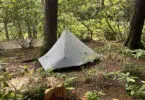
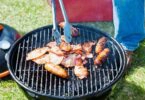
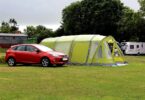
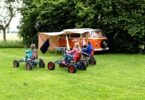
Well, I think that if you go to do camping you need a lot of things. But the most important is the knife and the rope.
If your water or food finished you may die. But with the knife you can bag the food. For example, you can make the stick like a rod. And use it you can fishing. With the rope tou cabe make the share and catch the birds or rabbits. It can save your life.
Well, you don’t need too many things when you go camping (especially if you choose to go by foot). On the other hand, if it happens and you get lost or you go through an emergency situation, a knife and a rope will be very helpful indeed. However, a small survival pack with a first aid kit and other essentials should also be among your most valued items.
Cellphone charger, trash bags, cloth, lots of paracords – are the things that are often undervalued or their practicality.
I learned to make lists and inventory organization, so I rarely forget things. What I do every time I go, is I improve on what is important and what is not, practice really makes perfect.
Thank you Peter for sharing your tips with us. These are great ideas, and really, we should always learn from mistakes and improve on what we can.